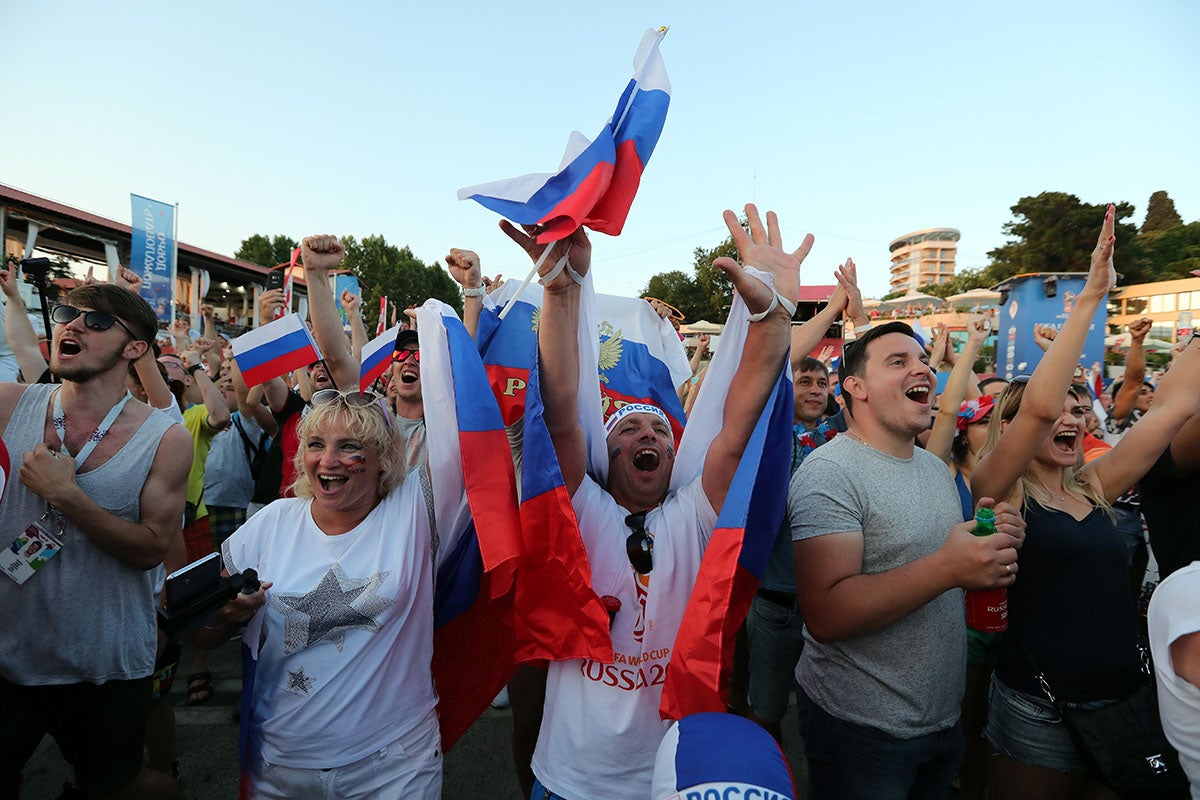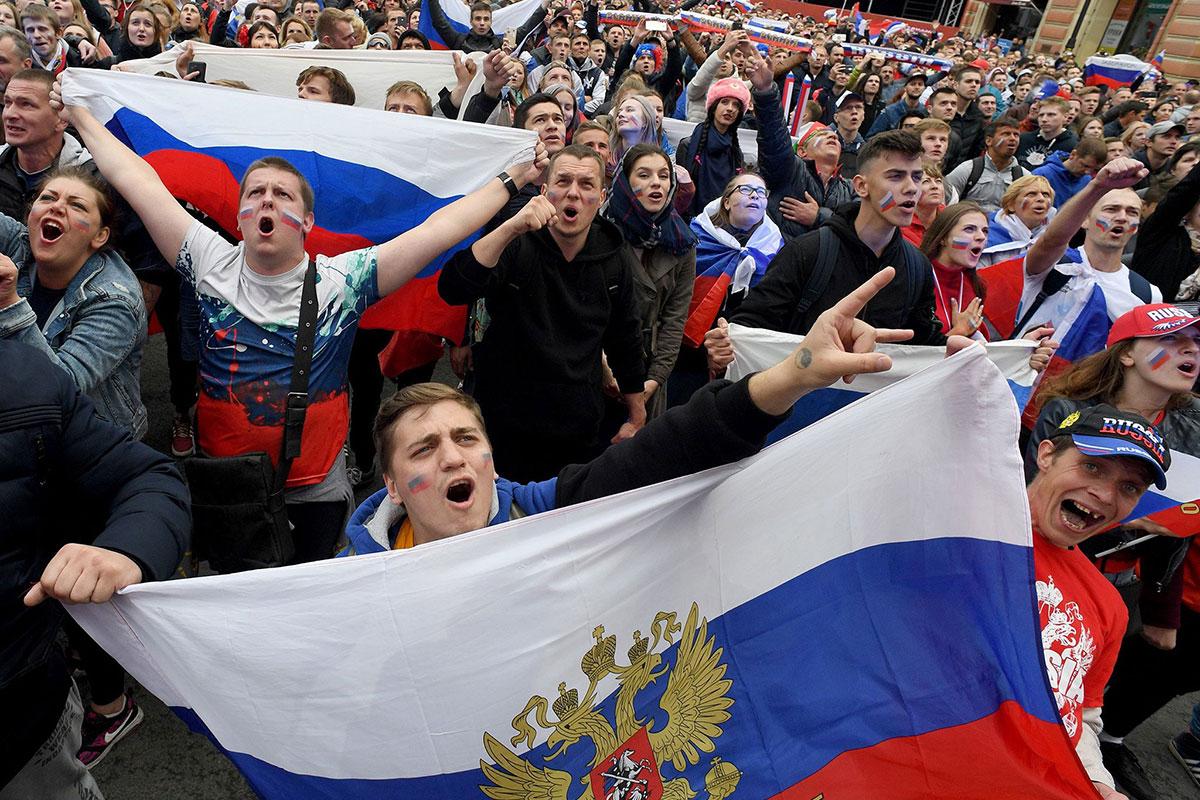World Cup 2018: Is Russia’s revolution the real deal or just more Potemkin villages?
Perhaps it’s a mixture of the real and the decorative, in which everyone is in on the illusion but suspends their credulity for the common good

Your support helps us to tell the story
From reproductive rights to climate change to Big Tech, The Independent is on the ground when the story is developing. Whether it's investigating the financials of Elon Musk's pro-Trump PAC or producing our latest documentary, 'The A Word', which shines a light on the American women fighting for reproductive rights, we know how important it is to parse out the facts from the messaging.
At such a critical moment in US history, we need reporters on the ground. Your donation allows us to keep sending journalists to speak to both sides of the story.
The Independent is trusted by Americans across the entire political spectrum. And unlike many other quality news outlets, we choose not to lock Americans out of our reporting and analysis with paywalls. We believe quality journalism should be available to everyone, paid for by those who can afford it.
Your support makes all the difference.In January 1787 Catherine the Great, the empress of Russia, took a long boat trip down the Dnieper River to visit her latest conquests. A few years earlier, her armies had defeated the Ottoman Empire and annexed the Crimea, and the within the imperial court, the hope was that these wild southern steppes would form the basis of an entire new satellite territory known as ‘New Russia’, along the lines of New England, or the French and Spanish colonies of North America. The indigenous population would be swept aside; Russian settlers would descend from the north in search of a new life, populating new towns and villages that would be built from scratch: cementing the power and span of the Russian empire, spreading the Russian values of civilisation and enlightenment all the way to the Black Sea.
There was one problem: as Catherine’s barge trundled up the Dnieper, filled with excited ambassadors and dignitaries, very little of this had actually happened yet. And so according to contemporary accounts, the governor of the region Grigory Potemkin, eager to impress his ruler - who also happened to be his lover - sent advance parties along the river to build entire fake villages along the banks of the river, populated by government officials dressed as peasants. As the royal fleet passed, the same buildings would swiftly be dismantled, and under cover of night, rebuilt several miles downstream. To this day, the term ‘Potemkin village’ is used to denote any artificial construction built purely for the purposes of show, propaganda or disinformation.
In the centuries since, historians have managed to pick a few holes in the tale of the Potemkin villages. There is some debate, for example, over the scale of the subterfuge, with some accounts contending that it consisted merely of a few life-size models rather than entire settlements. Some contend that there was no subterfuge at all, and that Catherine would surely have been aware that the whole display was essentially ersatz. Others argue that the entire diorama was constructed not for Catherine’s benefit but for those of her foreign visitors, a facade that would blazon Russian power and efficiency all over the world. But whichever explanation you subscribe to, the central point is more or less unchanged. Russia has always been one of those places where the lines between the real and the artificial are frequently blurred to the extent where it is no longer meaningful to draw any distinction between them. Where the end ultimately satisfies the means. Where what matters is not what is, but what you see.
All of which brings us, in a fittingly meandering and artificial way, to the Russian football team, which footballing logic dictates shouldn’t be anywhere near a World Cup quarter-final, but somehow - and just as definitively - is. Their 1-1 win on penalties against Spain at the Luzhniki Stadium in Moscow on Sunday night was the catalyst for an outbreak of all-night partying in the Russian capital, in scenes the Kremlin described as akin to the celebrations of victory over Nazi Germany in May 1945. Stanislav Cherchesov’s team will now play Croatia in Sochi on Saturday night after a rest of more than six days, the longest of any of the eight quarter-finalists. England or Colombia, by contrast, will get less than four should they come through their last-16 game in Moscow on Tuesday night.
All of which should give Russia plenty of time to recover after their exhausting exploits against Spain, although one of the main lessons of this tournament is that the energy of this Russia side may well have no upper limit. Of the teams remaining in the tournament, they have collectively run over 35km further than their nearest challengers Croatia. They have run 10 per cent further without the ball than any other team. And this, remember, after playing for almost an hour with only 10 men against Uruguay, a game they lost 3-0, putting them both in the most favourable half of the draw and allowing them to stay in Moscow, the city in which they have based themselves.

Certainly, Russia have arrived at their own tournament in remarkable physical shape. “Our medics are working well,” Cherchesov said after the match. “Physiology comes first here.” Yet for a country with a well-documented history of doping its athletes, both before and after the fall of the Iron Curtain, and whose leading scorer Denis Cheryshev was forced to deny ahead of the Spain game a claim made by his own father that he had used human growth hormone, perhaps it was only natural that sceptical questions would be asked.
Cherchesov, when pressed on this earlier in the tournament, made three counter-arguments. Firstly, that Russia have always been a very fit side, even when they weren’t necessarily very good. Secondly, that the adrenalin of playing in front of a partisan home crowd and the emotion of representing 144 million people has lifted them to extraordinary heights. Thirdly, that Russia’s game, while physical, is based on a lot more than running.
There’s some truth to all of these, of course. Russia were full of energy during last summer’s Confederations Cup, too, when they went out at the group phase. And no amount of running would have helped Russia to put away all six of their penalties, while goalkeeper Igor Akinfeev managed to save from both Koke and Iago Aspas. Footage on social media showed Akinfeev practising his “kung-fu” penalty technique with striker Artem Dzyuba ahead of the game, and his acrobatic save from Aspas with his left foot raised high above the ground suggested that in part, Russia’s success may well simply be meticulous preparation masquerading as assisted excellence.

But we can say that the cards have fallen wonderfully for the host nation: a team ranked lowest of all 32 teams in the Fifa rankings, but benefiting from a soft start against Saudi Arabia and Egypt, scraping through against the pre-tournament favourites in a game where they had just 21 per cent of possession, and now at the mouth of an extremely open draw in which the highest-ranked team is Switzerland.
There are parallels here with 2002, a tournament where which many of the pre-tournament favourites were eliminated early, and co-hosts South Korea rode a tide of patriotic fervour and irresistible momentum to cut a swathe to the semi-finals. But there are differences, too. There have been very few of the egregious refereeing howlers that characterised South Korea’s run to the last four; Russia’s progress can, to a large extent, be explained by the ineptitude of the teams they have come up against. Spain, in particular, were a pale shadow of the team that has not lost an international fixture for two years, and created shockingly little against a team who barely ventured out of its own half.
Equally, though, something about this feels different. The simple and heartwarming trope of a sporting underdog triumphing against the odds doesn’t really hold true when you’re the world’s largest country and a global superpower, with more Olympic medals than anybody but the United States and the biggest stockpile of nuclear weapons on the planet. Russia are a giant masquerading as a minnow, which is why - to a large extent - we’re in uncharted territory.
Can they win the whole thing? It’s still hard to envisage, but then so was this. Put it this way, in the absence of any firmer evidence: in a country with a long and entrenched history of submitting sport to political ends, and with every incentive to ensure that their £11bn spectacle goes exactly according to plan, is it reasonable to expect that Russia would leave the slightest detail to chance?
The unfettered joy of its citizens at their unexpected run to the quarter-finals doesn’t negate any of this. In fact, it’s the entire point. This is why any debate over whether Russia’s success at this tournament has been “genuine” or not risks missing the nub of the issue entirely. Perhaps it’s to expound the glory of the new Russia to the world. Perhaps it’s to satisfy the patriotic lust of a home audience. Perhaps, like those Potemkin villages, it’s a mixture of the real and the decorative, in which everyone is in on the illusion but suspends their credulity for the common good. Perhaps nobody will ever know the real truth, and perhaps it barely matters. What matters, after all, is not what is, but what you see.
Join our commenting forum
Join thought-provoking conversations, follow other Independent readers and see their replies
Comments